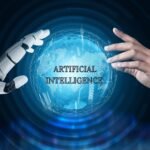Table of Contents
Introduction
Artificial Intelligence (AI) is no longer just a futuristic concept; it’s a transformative force reshaping the workforce across industries. From automating repetitive tasks to enhancing creativity, Artificial Intelligence empowers workers and businesses, driving efficiency, innovation, and growth. As Artificial Intelligence evolves, understanding its impact on jobs, roles, and the workplace becomes increasingly essential. This article delves into 15 ways Artificial Intelligence is changing the workforce, highlighting how it empowers employees and employers in this rapidly advancing digital age.
1. Automating Repetitive Tasks
One of the most significant ways Artificial Intelligence changes the workforce is by automating repetitive tasks. Whether it’s data entry, invoice processing, or even customer support, Artificial Intelligence can handle these mundane jobs faster and more accurately than humans. For example, in the manufacturing industry, AI-powered robots can assemble products quicker and more precisely, reducing errors and freeing human workers to focus on more complex and creative tasks. In offices, Artificial Intelligence tools like RPA (Robotic Process Automation) handle routine tasks such as scheduling meetings or managing email flows, allowing employees to dedicate their time to strategic activities.
2. Enhancing Decision-Making Processes
In our data-centric world, making well-informed decisions is essential. Artificial Intelligence helps businesses analyze vast amounts of data quickly and accurately, leading to better decision-making. Machine learning algorithms can identify patterns and trends that might be missed by human analysts, offering insights that drive business strategy. For instance, financial institutions use Artificial Intelligence to assess market conditions and predict trends, helping them make smarter investment decisions. Similarly, Artificial Intelligence tools analyze consumer behavior data in marketing to craft more effective campaigns.
3. Revolutionizing Customer Service
Customer service is another area where Artificial Intelligence is making a significant impact. AI-powered chatbots and virtual assistants are now common in many industries, providing 24/7 customer support. These tools can handle various inquiries, from simple FAQs to more complex troubleshooting tasks, with a response time that far outpaces human capabilities. This improves the customer experience and allows human customer service representatives to handle more intricate and value-adding tasks.
4. Personalizing Marketing Campaigns
AI’s ability to analyze consumer data is revolutionizing marketing strategies. By understanding customer preferences and behavior, Artificial Intelligence can create highly personalized marketing campaigns that resonate with individual consumers. For instance, Artificial Intelligence algorithms can predict what products a customer will likely buy next, allowing businesses to tailor their marketing messages accordingly. This level of personalization has led to increased engagement and conversion rates, making Artificial Intelligence a powerful tool in the marketer’s arsenal.
5. Transforming Healthcare
The healthcare industry is transforming, with Artificial Intelligence playing a critical role. From diagnostics to treatment planning, Artificial Intelligence is enhancing the capabilities of healthcare providers. Artificial Intelligence driven tools can more accurately analyze medical images than human doctors, identifying early signs of diseases such as cancer. Additionally, Artificial Intelligence is used to develop personalized treatment plans, considering a patient’s unique genetic makeup and health history, thus improving outcomes and patient care.
6. Optimizing Supply Chain Management
Supply chain management is another domain where AI is a game-changer. AI-powered predictive analytics helps companies forecast demand, optimize inventory levels, and streamline logistics. This reduces operational costs and ensures that products are delivered to customers more quickly and reliably. Companies like Amazon have set new standards in supply chain efficiency, leveraging Artificial Intelligence to predict buying trends and manage their vast inventory systems.
7. Enhancing Recruitment Processes
Recruitment is one of the most critical functions in any organization, and Artificial Intelligence is making it faster and more efficient. Artificial Intelligence tools can screen resumes and match candidates to job postings based on their skills and experiences, significantly reducing the time it takes to fill positions. Furthermore, Artificial Intelligence can help eliminate bias during the hiring process by focusing purely on data-driven criteria, thus promoting diversity in the workplace.
8. Advancing Employee Training and Development
Continuous learning and development are vital in today’s fast-paced work environment, and Artificial Intelligence plays a crucial role. AI-driven personalized learning platforms can assess employees’ skills and recommend tailored training programs to help them advance. Additionally, Artificial Intelligence can introduce gamification elements to training, making learning more engaging and effective. For example, companies like Coursera and Udemy use Artificial Intelligence to suggest courses based on an individual’s career goals and learning preferences.
9. Facilitating Remote Work
The shift towards remote work has been one of the most significant workforce changes in recent years, and Artificial Intelligence is at the forefront of this transition. AI-powered tools like collaboration platforms, virtual meeting assistants, and project management software make remote work more efficient and productive. These tools can automate scheduling, manage workflows, and analyze team dynamics to improve collaboration. As remote work becomes more prevalent, Artificial Intelligence will continue to play a crucial role in maintaining productivity and connectivity among dispersed teams.
10. Improving Workplace Safety
Workplace safety is another area where Artificial Intelligence is making a difference. Artificial Intelligence systems can monitor environments in real-time, detecting hazards such as gas leaks, machine malfunctions, or unsafe working conditions. By analyzing data from sensors and cameras, Artificial Intelligence can predict and prevent accidents before they happen, ensuring a safer workplace. For instance, in construction, AI-powered drones and sensors monitor sites for safety compliance, reducing the risk of accidents and improving overall safety standards.
11. Empowering Creative Work
Contrary to the fear that Artificial Intelligence will replace creative jobs, it enhances them. Artificial Intelligence tools are used in art, writing, music, and content creation to assist human creativity. For example, Artificial Intelligence can generate content ideas, suggest edits, or even compose music, serving as a collaborative partner rather than a replacement. In advertising, Artificial Intelligence helps by analyzing trends and generating concepts that human creatives can refine and develop.
12. Enhancing Financial Management
In the finance sector, Artificial Intelligence is helping businesses and individuals manage their finances more effectively. AI-powered tools can automate routine tasks like bookkeeping and tax preparation, reducing the likelihood of errors and freeing up time for more strategic financial planning. Moreover, Artificial Intelligence is being used for risk assessment and fraud detection, identifying suspicious activities that might go unnoticed by human analysts. These advancements are helping companies safeguard their finances and make more informed financial decisions.
13. Supporting Sustainable Practices
Sustainability is becoming a key focus for many businesses, and artificial intelligence is playing a pivotal role in this shift. Artificial Intelligence can optimize energy usage in buildings, reduce waste in manufacturing processes, and even monitor environmental impact in real-time. For example, AI-driven systems can adjust lighting, heating, and cooling in office buildings to reduce energy consumption. Additionally, Artificial Intelligence can help companies track their carbon footprint and develop strategies to reduce it, contributing to more sustainable business practices.
14. Fostering Innovation and New Job Creation
While there is often concern about Artificial Intelligence leading to job losses, it also creates new opportunities and industries. Artificial Intelligence catalyzes innovation, leading to the development of entirely new job roles that didn’t exist before. For instance, the rise of Artificial Intelligence has led to the demand for Artificial Intelligence specialists, data scientists, and machine learning engineers—roles focused on developing, maintaining, and improving Artificial Intelligence systems. Moreover, Artificial Intelligence fosters innovation in sectors like robotics, autonomous vehicles, and smart home technology, creating jobs in areas that are only beginning to emerge. As businesses continue integrating Artificial Intelligence, they will need skilled professionals to navigate this new landscape, creating new job opportunities.
15. Promoting Diversity and Inclusion
Artificial Intelligence also plays a vital role in promoting diversity and inclusion within the workplace. By eliminating human biases in hiring and promotion processes, Artificial Intelligence helps ensure that decisions are made based on merit rather than unconscious biases. For example, AI-driven tools can anonymize resumes during the recruitment process, focusing solely on the skills and qualifications of candidates without any bias related to gender, ethnicity, or background. Additionally, Artificial Intelligence can analyze company data to identify diversity gaps and suggest strategies to foster a more inclusive work environment. This helps create a fairer workplace and builds a more diverse and innovative workforce.
Conclusion
As we’ve explored, Artificial Intelligence is reshaping the workforce profoundly, from automating routine tasks to fostering innovation and promoting diversity. Far from merely replacing jobs, Artificial Intelligence is enhancing the capabilities of human workers, allowing them to focus on more meaningful, creative, and strategic aspects of their roles. As Artificial Intelligence continues to evolve, its impact on the workforce will only grow, offering new opportunities for those willing to adapt and learn. The future of work is not just about Artificial Intelligence replacing humans but about how humans and Artificial Intelligence can collaborate to achieve greater efficiency, creativity, and inclusivity in the workplace.









